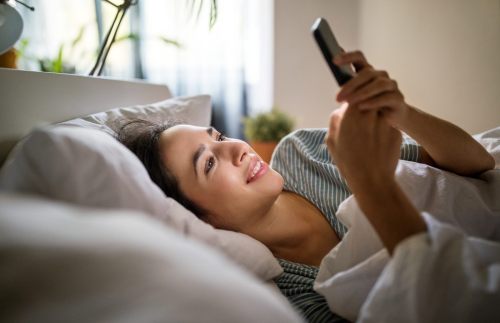Our editors independently select these products. Making a purchase through our links may earn Well+Good a commission
I switched to a sunrise alarm clock, and I’m no longer dreading early wake-up calls
Ever wonder whether sunrise alarms work (especially on mornings when you really can't chance oversleeping)? Here's what happened when an editor tried one.

I don’t care how much of a morning person you are: getting jolted out of a deep sleep by a blaring alarm clock never feels like good times. (Especially when it interrupts a really good dream, like the one I recently had involving a figure-skating session with JVN. Now I’ll never know if I landed my double axel…)
Perhaps that’s why sunrise alarm clocks are having such a moment right now. Devices like Philips’ Wake-Up Light Alarm Clock ($43) and Casper’s Glow Light ($99) gradually illuminate your room in a way that mimics morning light, softly waking you from slumber without any obnoxious beeping, chiming, or buzzing noises. The idea is to feel as if you’re waking up naturally—despite the fact that you’re doing it on demand, at a specific time of your choosing.
And according to Alex Dimitriu, MD, founder of Menlo Park Psychiatry & Sleep Medicine, sunrise alarm clocks can actually be effective because they tap into the body’s innate biorhythms. “There is some evidence that natural morning light can actually help prepare the body to wake up,” he says. “This make sense, as our circadian system is closely tuned to natural as well as artificial light. Light-based alarm clocks can provide a gentle wake signal, to prepare the body for wakefulness.”
Here’s how it works, according to the National Sleep Foundation: When we’re exposed to light in the morning, our brain prompts our body temperature to rise and our cortisol levels to increase. (Although cortisol has a bad rap as a “stress hormone,” it’s actually normal to have higher cortisol levels in the morning, as that’s what wakes us (and our libido) up.) At the same time, levels of sleep-inducing hormones like melatonin drop off, rousing us from sleep.
“Our circadian system is closely tuned to natural as well as artificial light. Light-based alarm clocks can provide a gentle wake signal, to prepare the body for wakefulness.”—Alex Dimitriu, MD
Skeptically intrigued by the prospect of retiring my shouty alarm clock, I decided to give the more natural method a try. Would I actually wake up on time using a sunrise alarm? It felt like a risky method, especially on days when oversleeping isn’t an option, so I decided to conduct my experiment on a low-stakes morning.
Since I was already testing out Google’s Pixel 3 phone (from $449), which has a Sunrise Alarm feature that can be activated when paired with the Pixel Stand ($79), a wireless charging hub, I used that device option. When the Sunrise Alarm is activated, the phone’s screen slowly lights up in the 15 minutes before your chosen wake-up time, shifting from red to orange to bright yellow—the colors of the natural sunlight at dawn. (If you have an iPhone, you can download apps that claim to give you the same effect—however, based on the reviews for these, they aren’t always reliable.)
On the night before my experiment, I set the phone’s alarm for 5:30 a.m.—about an hour before the actual sunrise was set to happen—crossed my fingers, and went to bed. I made sure all my audio alarms and vibrations were turned off so I could measure whether the Sunrise Alarm alone would be able to wake me up. I also placed the phone and Pixel Stand on the other side of my room, to test the light’s effectiveness for rustling me from my dreams without being right next to my bed. (Sleeping next to your devices is a no-no, according to lots of sleep experts.)
When I woke up the next morning, before I opened my eyes, I had the distinct impression that it was daylight. But when I finally looked around my room I noticed that it was still dark out, aside from the bright-yellow glow emanating from the phone propped up on my dresser. I felt as refreshed and calm as I might had I gotten a full 10 hours of sleep (even though I’d actually had trouble falling asleep the night before). I glanced at the tablet on my bedside table to see what time it was—5:31 a.m. Impressive.
The phone stayed illuminated for a few minutes, after which it slowly faded back to black. But I didn’t have the urge to hit snooze or go back to sleep, like I usually do when an alarm clock wakes me up. I got up right away, turned on my bedroom light, and went about my morning.
And now, I’m a proud sunrise-alarm-clock convert. (Although I’d still probably set a backup audio alarm for important mornings, just to be careful.) That said, Dr. Dimitriu claims the same gradual awakening effects are available via other methods—for instance, setting an audio alarm that starts off quiet and slowly increases in volume so it’s not so startling. And on mornings when I have more time, I’m a fan of the Yoga Wake Up app, which rouses you with the sound of a yoga teacher’s soothing voice and leads you through an in-bed yoga or meditation routine.
But no matter which dreamy course of action you choose, knowing that options abound for a more pleasant wake-up call is heartening. So go ahead and bring on those 6 a.m. flights and sunrise boot-camp classes. I’m ready.
Here’s what your go-to sleeping position says about you, according to experts. And for those nights when you don’t get a full eight hours of shut-eye, keep this under-eye circle concealing trick in your back pocket.
Sign Up for Our Daily Newsletter
Get all the latest in wellness, trends, food, fitness, beauty, and more delivered right to your inbox.
Got it, you've been added to our email list.










